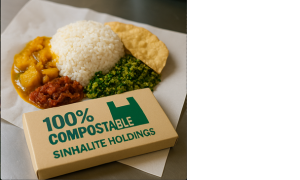
Aug 12 2025.
views 67By Tina Edward Gunawardhana
Sri Lanka’s war on single-use plastics has gained a powerful new ally. Sinhalite, a homegrown brand, has just launched compostable lunch sheets, offering a sustainable alternative to the ubiquitous plastic ones that choke waterways, pollute beaches, and threaten wildlife. We sat down with a Sinhalite Founder, Ishan Karunaratne, to learn more about this eco-friendly innovation and its potential to change everyday habits.

Q: What inspired Sinhalite to develop compostable lunch sheets?
A: We’ve all seen the devastating effects of plastic waste in our environment — from clogged drains during monsoons to marine animals dying from ingesting plastic. It’s not just unsightly; it’s dangerous. We wanted to create a product that addresses this issue at its root. Compostable lunch sheets offer a practical, eco-friendly alternative that doesn’t compromise on convenience, making it easier for people to make a positive change.
Q: How are these lunch sheets different from the regular plastic ones?
A: The main difference is in their composition and life cycle. Traditional lunch sheets are made from petroleum-based plastics that take hundreds of years to break down, releasing toxins in the process. Our compostable sheets are made from plant-based materials, which naturally decompose within months under composting conditions, leaving behind no harmful residue.
Q: Some people worry that compostable products aren’t as durable. How do yours hold up?
A: That’s a common misconception. Our lunch sheets are strong, heat-resistant, and moisture-proof — perfect for wrapping rice packets, snacks, or any other food items. They perform just like plastic sheets while being much kinder to the environment.
Q: Who do you see as your primary customers?
A: We’re targeting a wide audience — food vendors, restaurants, supermarkets, and everyday consumers. Street food culture is huge in Sri Lanka, and lunch sheets are part of that daily routine. By switching to compostable options, vendors can make a big impact without altering their business model.
Q: How has the public and environmental community responded so far?
A: The response has been overwhelmingly positive. Environmental advocates and community leaders have called this a step in the right direction. Many believe it will inspire both policy changes and broader adoption of eco-friendly alternatives.
Q: How do you see this initiative contributing to Sri Lanka’s environmental goals?
A: Sri Lanka has been grappling with plastic waste for years. While bans and regulations help, real change happens when people have viable, affordable alternatives. This launch gives the public a chance to take action in their everyday lives, helping reduce landfill waste, protect marine life, and improve overall environmental health.
Q: What other initiatives have you taken to protect the environment?
A: Beyond innovating with eco-friendly materials, we believe in leading by example. One of our key community projects is our beach clean-up initiative. We work with local volunteers and environmental groups to remove plastic waste from Sri Lanka’s coastline. These events aren’t just about cleaning — they’re about inspiring others to take action. By physically participating, we show that sustainability means both innovation and hands-on commitment. Our goal is to restore the natural beauty of our beaches while reminding everyone that protecting the environment is a shared responsibility.
Q: What’s next for Sinhalite?
A: We want to expand our range of compostable and biodegradable products, and we’re working on educational campaigns to raise awareness about the benefits of making the switch. The future of Sri Lanka’s environment depends on the choices we make today, and we want to make those choices as easy as possible for everyone.
0 Comments